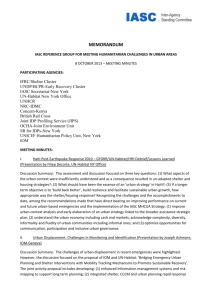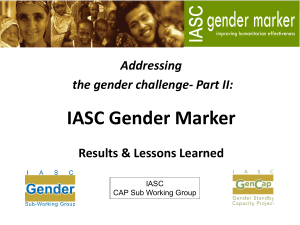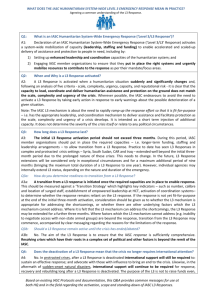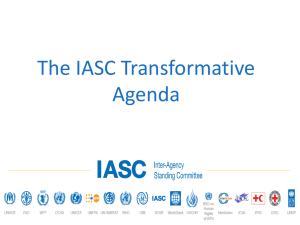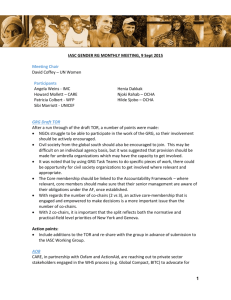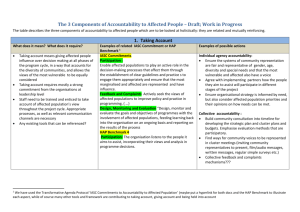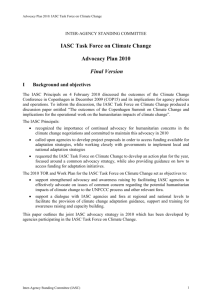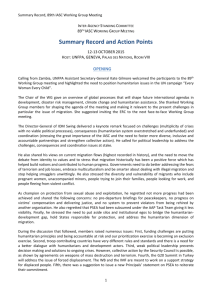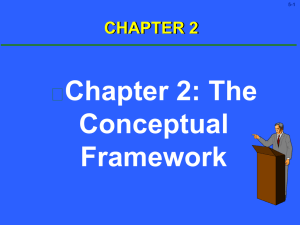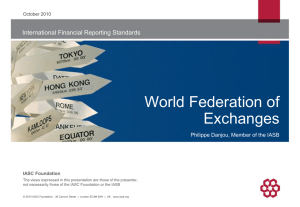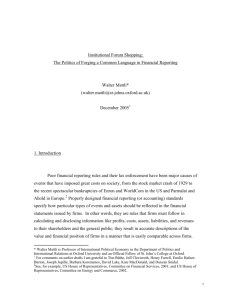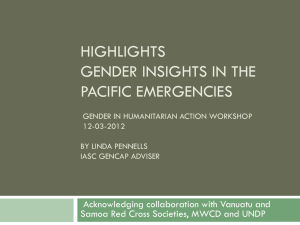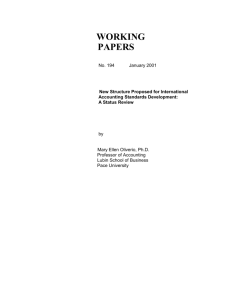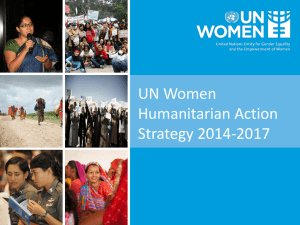ToRs Oct 2013
advertisement
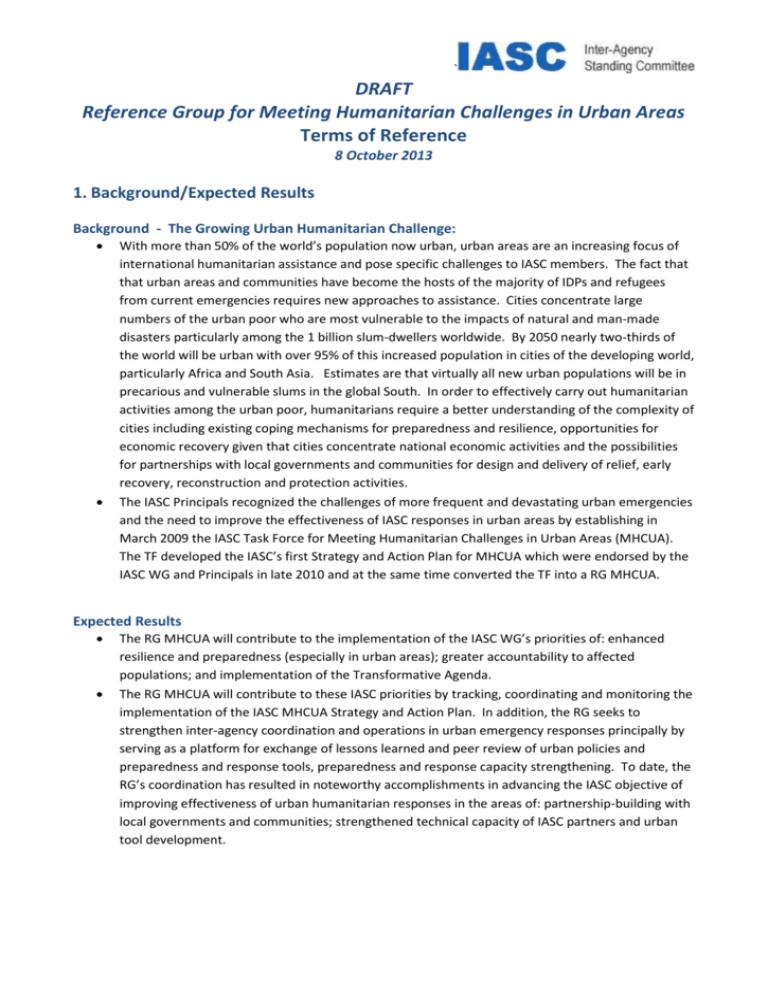
` DRAFT Reference Group for Meeting Humanitarian Challenges in Urban Areas Terms of Reference 8 October 2013 1. Background/Expected Results Background - The Growing Urban Humanitarian Challenge: With more than 50% of the world’s population now urban, urban areas are an increasing focus of international humanitarian assistance and pose specific challenges to IASC members. The fact that that urban areas and communities have become the hosts of the majority of IDPs and refugees from current emergencies requires new approaches to assistance. Cities concentrate large numbers of the urban poor who are most vulnerable to the impacts of natural and man-made disasters particularly among the 1 billion slum-dwellers worldwide. By 2050 nearly two-thirds of the world will be urban with over 95% of this increased population in cities of the developing world, particularly Africa and South Asia. Estimates are that virtually all new urban populations will be in precarious and vulnerable slums in the global South. In order to effectively carry out humanitarian activities among the urban poor, humanitarians require a better understanding of the complexity of cities including existing coping mechanisms for preparedness and resilience, opportunities for economic recovery given that cities concentrate national economic activities and the possibilities for partnerships with local governments and communities for design and delivery of relief, early recovery, reconstruction and protection activities. The IASC Principals recognized the challenges of more frequent and devastating urban emergencies and the need to improve the effectiveness of IASC responses in urban areas by establishing in March 2009 the IASC Task Force for Meeting Humanitarian Challenges in Urban Areas (MHCUA). The TF developed the IASC’s first Strategy and Action Plan for MHCUA which were endorsed by the IASC WG and Principals in late 2010 and at the same time converted the TF into a RG MHCUA. Expected Results The RG MHCUA will contribute to the implementation of the IASC WG’s priorities of: enhanced resilience and preparedness (especially in urban areas); greater accountability to affected populations; and implementation of the Transformative Agenda. The RG MHCUA will contribute to these IASC priorities by tracking, coordinating and monitoring the implementation of the IASC MHCUA Strategy and Action Plan. In addition, the RG seeks to strengthen inter-agency coordination and operations in urban emergency responses principally by serving as a platform for exchange of lessons learned and peer review of urban policies and preparedness and response tools, preparedness and response capacity strengthening. To date, the RG’s coordination has resulted in noteworthy accomplishments in advancing the IASC objective of improving effectiveness of urban humanitarian responses in the areas of: partnership-building with local governments and communities; strengthened technical capacity of IASC partners and urban tool development. Tasks The RG MHCUA’s upcoming tasks are consistent with IASC Principals’ and WG’s priorities and advance the implementation of the Transformative Agenda including at the field level. Key results include: 1. Urban Preparedness and Resilience Model to be based on city pilots in partnership with local governments and communities with replication worldwide to enhance preparedness in urban responses 2. New Operational Plan for Urban Areas as a first-time, multi-agency urban response plan/operational framework to improve inter-agency coordination and accountability for results to national/local partners and affected populations of emergency operations in urban areas 3. Urban Vulnerability and Resilience Assessments and Indicators developed by agencies in various sectors, including built environment, nutrition and food security, to better assess tipping points from vulnerability to crisis and to improve preparedness in chronically vulnerable contexts 4. Local Government and Local Community Partnerships for more effective and accountable humanitarian responses disseminated and replicated based upon good practices of IASC member agencies 5. IASC Inter-Agency Partnerships developed and strengthened to build urban response capacity and to improve the results and impacts of urban humanitarian responses 6. IASC Urban Emergency Tools Assessment updated and broadly disseminated based upon the initial tools assessment carried out by the IASC TF MHCUA. 2. Working Methods Chairs/Co-chairs UN-Habitat’s Geneva Office Director, George Deikun, is one of two Co-Chairs of the RG MHCUA and coordinates the substantive implementation of the work plan. The second Co-Chair is currently vacant and will be filled by a volunteer agency, preferably non-UN agency, in the coming months. Tasks coordinated by the (Co-)Chairs include: with information provided by participants of the RG MHCUA. the (Co-)Chair supports the drafting the annual work plan for discussion and agreement by the RG; maintains an e-mail distribution list of participants convenes meetings of the Task Team at the request of the Chair(s) and is responsible for venue arrangements and related logistics; drafts and distributes the agenda and minutes and keeps a participants’ list for each meeting; prepares materials for distribution to the Task Team and facilitates the flow of communication; and works closely with the IASC Secretariat to ensure that the IASC website and calendar are updated with information relevant to the Task Team. Participation Membership in the Reference Group is open to all organizations, IASC and others, which are interested in actively contributing to the work of the Reference Group and the implementation of IASC Meeting Humanitarian Challenges in Urban Areas Strategy and Action Plan. 2 Participation is open to interested humanitarian organizations. Potential members could include: IASC agencies, other NGOs, other UN agencies, other international organizations, cluster/sector representatives, donors and academics. Participants represent their organizations and, where applicable, ensure that their WG or EDG representatives or Principals are briefed on the RG’s work and progress. Meeting schedule and frequency The RG MHCUA will seek to meet on a quarterly basis, as a minimum, but will meet more frequently, as required and requested by RG members. Meeting attendance can be in person, by video or telephone. 3. Reporting Accountability The 84th IASC Working Group in March 2013 agreed that Reference Groups are voluntary "communities of practice" affiliated to but not directly overseen by the IASC. The RG MHCUA will enable the IASC organisations to share knowledge, experience and resources in support of existing IASC policies, to identify new policy issues for the WG’s consideration, and to implement and disseminate IASC products and decisions. The RG MHCUA is chaired by George Deikun, UN-Habitat’s Geneva Office Director, who is a WG member who also serves as its sponsor in the WG. Reporting to the WG Although the RG MHCUA has no formal reporting responsibilities to the WG, progress updates, when requested by the Working Group, will be provided in writing or orally to the WG, for information. Monitoring implementation The Task Team Working Group Sponsor(s) and Co-Chairs are responsible for monitoring implementation of the Task Team’s objectives and work plan, with the support of the IASC Secretariat. Include language here that provides more specific details on how implementation will be monitored or if any specific actions are required to ensure monitoring of implementation. IASC Working Group Sponsor(s): George Deikun, UN-Habitat Geneva Office IASC RG MHCUA (Co-)Chair(s): George Deikun, UN-Habitat Geneva Office 3 Annex: The Role of IASC WG Sponsors The term 'Sponsor' is a new designation at the IASC. In essence, a Sponsor is a Working Group member who oversees and advocates for a particular priority, and ensures that policy development for the said priority is aligned at all levels – from designation by the Principals, through discussion at the WG, and through elaboration at the Task Teams. In some cases, the Sponsor will also be a Co-Chair of a Task Team (TT)/Reference Group (RG); where this is not the case, the Sponsor should ideally be from the same organization as the Co-Chair of the relevant TT/RG. More precisely, the functions of WG Sponsors are as follows: Act as a manager, or focal point, for the IASC priority; Ensure a liaison function between the TT/RG and the WG; Advocate for the priority or the TT/RG’s work vis-à-vis the WG, when necessary; Facilitate the TT/RG getting items on the WG agenda for discussion and decision, when necessary; Provide strategic guidance to the TT/RG; and Work closely with the TT/RG (Co-)Chairs to ensure accountability of the TT/RG to deliver on the expected results within the set time frame. As the IASC Secretariat closely follows each of the IASC subsidiary bodies, the WG Sponsors can call upon the IASC Secretariat to support them in the above functions. 4
